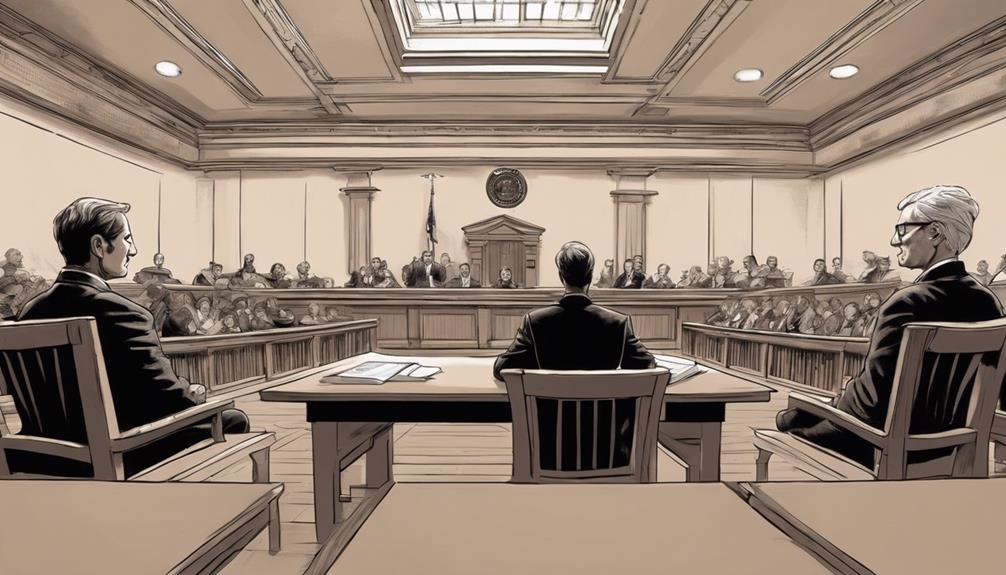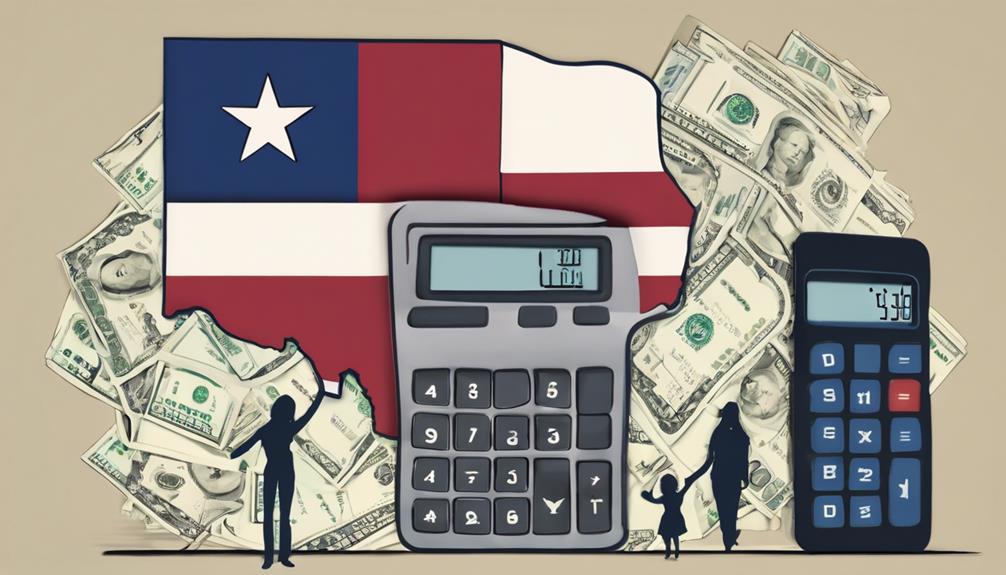Are you curious about how to navigate a divorce in Nevada? Have you considered the key steps for a seamless process? This guide offers a comprehensive overview for couples seeking to dissolve their marriage in the Silver State.
With detailed insights on key aspects like filing procedures, financial disclosures, and post-divorce considerations, it equips you with the knowledge needed to navigate the legal terrain confidently.
Stay tuned to uncover essential tips for a successful divorce journey in Nevada.
Key Takeaways
- Accurate completion of initial divorce forms is crucial for starting proceedings.
- Negotiating settlement terms on custody, support, and assets is vital.
- Proper service of divorce papers and financial disclosures are essential steps.
- Seek emotional support, update legal documents, and focus on post-divorce transition.
Filing Initial Divorce Papers
Let's dive into the process of filing your initial divorce papers in Nevada to kickstart the legal proceedings smoothly and efficiently. Accuracy is key when completing the necessary forms such as the Cover Sheet, Summons, and Complaint for Divorce. Ensuring every section is filled out accurately is crucial to prevent any delays or complications during the filing process. Once these forms are accurately filled out, it's time to file them at the district court in Nevada for proper processing.
Understanding the filing fee is also essential. Remember, this fee varies by county in Nevada, so be sure to check the specific cost where you're filing. If eligible, explore fee waiver options to alleviate this expense. Filing your initial divorce papers accurately and in a timely manner is the first step to initiating the divorce proceedings in Nevada. By following these steps diligently, you can set the foundation for a smoother divorce process ahead.
Serving the Divorce Papers

Ensuring that divorce papers are properly served is crucial for moving the legal process forward smoothly.
Failure to serve the necessary documents to the spouse could result in the dismissal of the case.
It's essential to understand the legal service requirements, available delivery methods, and the proof of service needed for a successful divorce process.
Legal Service Requirements
Understanding the legal service requirements for serving the divorce papers is crucial for ensuring the smooth progression of the divorce process. When it comes to serving divorce papers, there are key points to keep in mind:
- Proper Service: Serving the divorce papers to your spouse must be done correctly to comply with legal requirements.
- Avoiding Failure: Failure to serve the summons and complaint to your spouse can result in case dismissal, causing delays and complications.
- Personal Responsibility: The court doesn't handle the service of divorce papers on your behalf, emphasizing the importance of understanding and following the serving procedures diligently to move the divorce forward effectively.
Delivery Methods Available
Properly serving divorce papers in Nevada requires careful consideration of the available delivery methods to ensure the legal process progresses smoothly. When you file for divorce, serving the papers is a crucial step in the divorce process. Remember, the court won't serve the divorce papers for you.
Understanding the serving procedures is vital to avoid any delays in your divorce case. Serving the defendant accurately is necessary to initiate divorce proceedings effectively. Failure to serve the papers correctly could result in the dismissal of your divorce case.
Proof of Service Needed
To ensure the smooth progression of your divorce process in Nevada, providing proof of service for the divorce papers is a necessary step. Properly serving the divorce papers is crucial for the court proceedings to move forward effectively. Here are key points to consider regarding proof of service:
- Legal Requirement: Proof of service is a legal requirement to demonstrate that the divorce papers were appropriately served to your spouse.
- Informing the Spouse: It's essential to ensure that the other party is informed about the legal proceedings through proper service of the divorce papers.
- Court Acceptance: Failure to provide adequate proof of service, such as a signed acknowledgment or an affidavit of service, can lead to delays or even dismissal of the case.
Completing Financial Disclosures

When completing financial disclosures in a Nevada divorce case, both parties are required to provide accurate and detailed information about their income, assets, debts, and expenses. These financial disclosures are mandatory in Nevada divorce cases to ensure transparency and fairness in the legal process. Failing to disclose accurate information can have serious legal consequences, impacting property division and support determinations.
It is essential to be thorough and honest when disclosing financial details. Income should include all sources, such as salaries, bonuses, investments, and any other financial benefits. Assets encompass properties, vehicles, bank accounts, retirement savings, and valuable possessions. Debts consist of mortgages, loans, credit card balances, and any other liabilities. Expenses should cover monthly spending on necessities like housing, utilities, food, transportation, education, and healthcare.
Negotiating Settlement Terms

Navigating through the negotiation process for settlement terms in a divorce involves crucial discussions on asset division, spousal support, child custody, and visitation arrangements. When engaging in negotiations, it's essential to address various financial matters and reach agreements on property distribution, debt allocation, and other relevant issues.
To facilitate this process effectively, consider the following:
- Collaborative Law: Utilizing collaborative law methods can aid in fostering productive negotiations and finding mutually agreeable solutions.
- Child Custody and Visitation Arrangements: Detailed discussions on child custody and visitation schedules are paramount to ensure the well-being of the children involved.
- Spousal Support and Asset Division: Delving into spousal support requirements and equitable asset division is crucial for achieving a fair and sustainable settlement.
Attending Mediation or Court Hearings

As we move forward in the divorce process, the next crucial step involves actively participating in mediation sessions or attending court hearings in Nevada.
Mediation serves as a valuable avenue to address contested issues such as child custody, support, and property division outside of the courtroom. With the guidance of a neutral third party, the goal is to foster mutual agreements and facilitate constructive dialogue between both parties.
On the other hand, court hearings become necessary when disputes can't be resolved through mediation. During these hearings, evidence is presented, arguments are heard, and ultimately, decisions are made by a judge regarding crucial aspects of the divorce proceedings.
It's essential to approach both mediation and court hearings with openness, preparation, and a willingness to engage in the process to ensure that the final divorce arrangements in Nevada are fair and satisfactory to all parties involved.
Finalizing the Divorce Decree

To officially complete the divorce process in Nevada, the final Decree of Divorce must be signed by the judge after a thorough review of the submitted documents. This step is crucial as it marks the official and legally recognized completion of the divorce process. The Decree establishes the terms of the divorce settlement, outlining important details for both parties to follow. Once the judge signs the Decree, it becomes a binding document that must be adhered to by all involved parties.
Key Points:
- Legal Recognition: The final Decree of Divorce grants the divorce official recognition under Nevada law.
- Completion of Process: Signing the Decree signifies the conclusion of the divorce proceedings.
- Documentation: Both parties are required to receive a copy of the Decree for their records and legal purposes.
Ensuring that the final Decree of Divorce is filed, signed by the judge, and distributed to all relevant parties is crucial for the divorce to be finalized and legally binding.
Post-Divorce Considerations

Considering the significant changes that come after divorce, it's important to address various post-divorce considerations to ensure a smooth transition into this new chapter of life. One crucial aspect is updating your will and estate planning documents to align with your current circumstances. It's essential to change beneficiaries on retirement accounts, life insurance policies, and other assets to reflect your wishes accurately.
Reviewing and updating joint financial accounts, debts, and obligations is also necessary to avoid any potential complications. Updating personal information on legal documents such as your driver's license and passport is important for consistency. Additionally, seeking therapy or counseling can help you navigate the emotional impact of divorce and adjust to post-divorce life more effectively.
Frequently Asked Questions
How Many Years Do You Have to Be Separated to Be Legally Divorced in Nevada?
We must live separately for at least 1 year in Nevada to be legally divorced. This period of separation sets the foundation for a no-fault divorce. It symbolizes the time needed for the dissolution of marriage.
What Is a Wife Entitled to in a Divorce in Nevada?
In a divorce in Nevada, a wife is entitled to an equal division of marital property, potential spousal support based on various factors, and a fair child custody and support arrangement that prioritizes the child's best interests.
Can You Get a Divorce Without Your Spouse's Signature in Nevada?
Yes, we can get a divorce without our spouse's signature in Nevada if they can't be located or refuse to participate. The court can proceed after proper service and no response. Following legal procedures diligently is crucial.
Can I File for Divorce in Nevada Without a Lawyer?
Yes, we can file for divorce in Nevada without a lawyer if both parties agree on all terms. It's important to ensure all forms are accurately completed. Legal assistance may be needed for complex cases.
Is the Process for Getting a Divorce in Nevada Similar to Getting a Divorce in Louisiana?
In Nevada, the process for how to get divorce differs from that in Louisiana. Nevada allows for “no-fault” divorces, which means couples can cite irreconcilable differences. Louisiana requires a period of separation before filing. Both states vary in residency requirements and property division laws.
Conclusion
In conclusion, navigating the divorce process in Nevada can be challenging, but with the right guidance and support, couples can successfully move forward with their lives. Remember, just as the desert sun always sets, so too can the storm of divorce pass.
By following the 7 steps outlined in this guide and seeking legal advice when needed, you can ensure a smoother transition and brighter future ahead. Stay strong and remember, you aren't alone in this journey.










